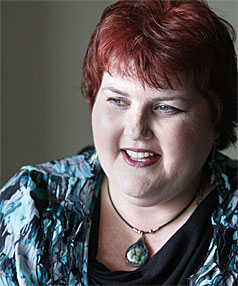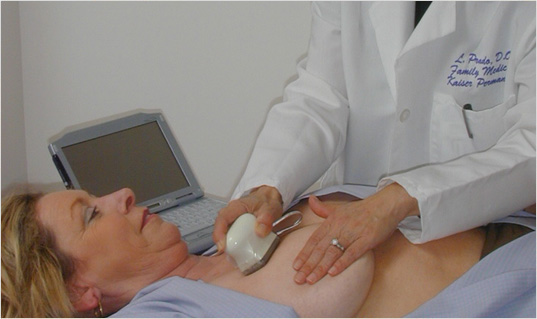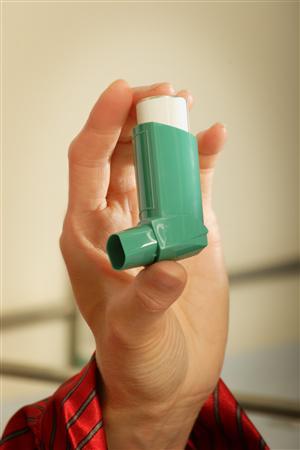
No treatment ‘not an option’ for ailing mum
Palmerston North’s Tarsh Stanton has run out of free options in her fight against cancer, and is looking for help to get to Melbourne to take part in a potentially lifesaving trial.
Within a year she has gone from being an active mother of two girls to what she describes as a steroid-puffed “blowfish”.
She’s in hospice care but determined to overcome stage four relapsed lung cancer that has spread to other organs.
She’s still working full time as ACC and non-residents co-ordinator at the MidCentral District Health Board, but chemotherapy and radiation treatment have failed to deliver on the 15 to 20 per cent chance of beating the cancer.
Only ever having had a few social puffs on cigarettes years ago, she said her cancer diagnosis came as a shock after what was either a lucky or unlucky cold.
She came home from a school camp at Whakapapa with her daughter Jazmin with an illness that became worse and made breathing difficult. Elder daughter Chelsea took her to the doctor, and the roller-coaster ride began.
Her heart beat was way too slow, and she was transferred to Wellington. She had a heart block that had to be corrected with a pacemaker last September.
X-rays showed shadows that were diagnosed as lung cancer adenosquamous non-small cell carcinoma. She was 36.
She’s had chemotherapy and radiation treatment, which has shrunk the cancer, but not stopped its spread to her other lung and bronchial tube, liver and stomach lining.
Reluctantly agreeing to be referred to the hospice team to fast track the process when she needs help with symptoms, such as the pain caused by the fluid building up between her ribs and lungs, she’s not ready to give up.
“The hospice is where you go to die, and I’m not going there,” she said.
“I’m quite relaxed. It’s not denial. I know what I’ve got, and I’m fully informed.
“I don’t like it much, but I can’t change it, and there’s no point in being sad and unfocused.”
Supported by a group of well-wishers led by her cousin Kelly Retter, Mrs Stanton has researched her options all of which cost money.
“No treatment is not an option.”
Her best hope in New Zealand is the unsubsidised drug Tarceva, which works like a sort of cling wrap encasing and constricting cancer cells, and offers a 40 per cent hope for patients who respond well. It costs about $28,000 a year.
But even more attractive is a phase II clinical trial at the Peter MacCullum Cancer Centre in Melbourne that combines Tarceva with a new biological ingredient that doesn’t even have a name yet.
Although participation is covered by drug company Roche, Mrs Stanton faces travel and accommodation costs for herself and a caregiver to travel to Melbourne for 25 appointments over two years.
Moving to Australia, where Tarceva is subsidised, is not an option.
“I’m a Kiwi. I live here, I work here, and I want to keep working. Time is precious, that’s one of the things this teaches you.
“If you only have so long to live, why would you want to spend it in Australia?”
At the moment Mrs Stanton is back in chemotherapy at Palmerston North Hospital because her cancer is too advanced to do nothing.
But once she gets the all-clear for the trial, she has to be chemo-free for a month before starting.
It’s a balancing act, as she has to be sick enough to qualify, yet well enough to tolerate the travel and treatment.
She’s hoping for Christmas in Palmerston North with husband Darren, and the girls, now aged 13 and 17, but if the trial schedule demands she be in Melbourne, she will be.
It’s a course she’s setting out on full of optimism.
“Eighty-six is my goal. It’s just a good number for sitting back in your rocking chair, drinking vodka.”
Her fundraising team is organising an October concert and a November auction to help pay for the $60,000 travel and expenses bills she’s likely to face.
No treatment, No treatment Health, No treatment Health Latest, No treatment Health Information, No treatment Health information, No treatmentHealth Photo,Exercising for Weight Health photo, No treatment Health Latest, No treatmentHealth latest, Exercising for Weight Health Story, Healthy Minnesota Health story, No treatment Video, No treatment video, No treatment Health History, No treatment Health history, No treatmentover Picture, history, No treatment Asia, Healthy Minnesota asia, No treatment Gallery, Exercising for Weight gallery, No treatment Photo Gallery, Healthy Minnesota photo gallery, No treatment Picture, No treatment picture, No treatment Web, Malaysia Health, web Health, web Health picture, video photo, video surgery, gallery, laparoscopy, virus, flu, drug, video, Health Health, calories, photo, nutrition, health video, symptoms, cancer, medical, beating, diet, physical, Training, organic, gym, blister, exercise, weightloss, surgery, spiritual, eating, tips, skin, operation, bf1, No, treatment, ‘not, an, option’ for, ailing, mum





